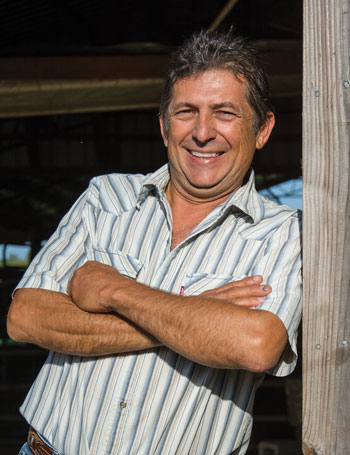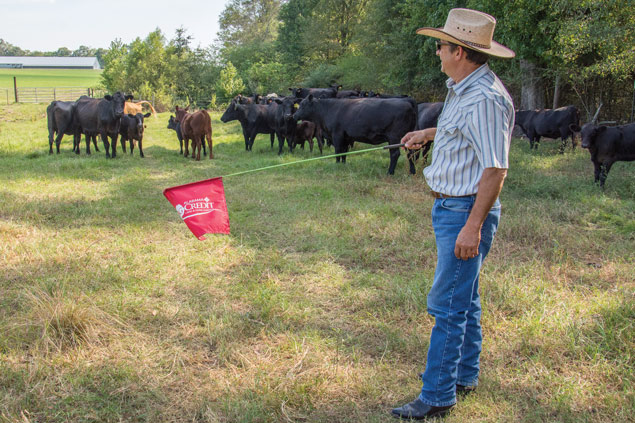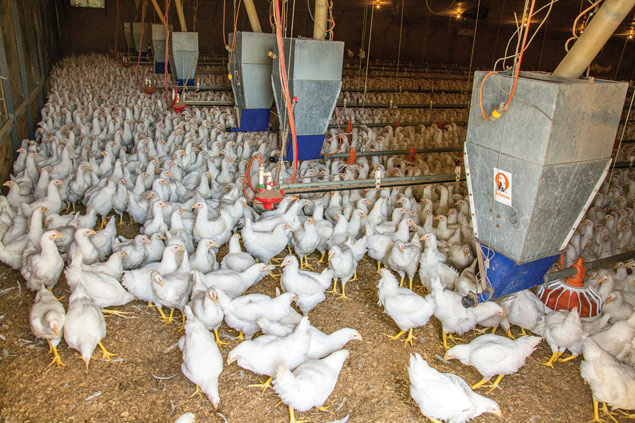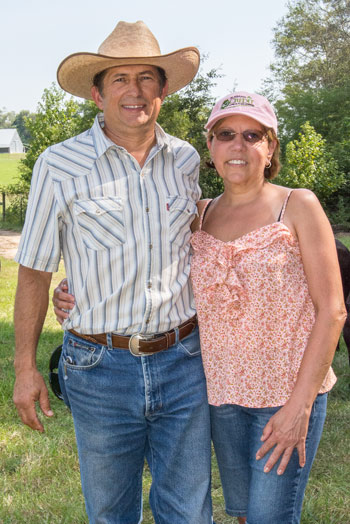On a fateful day 10 years ago, Florida resident Miguel Otero headed north across the state line into Alabama to check out some land where he could start his first farm since emigrating from Cuba as a youngster.

Photos by Sheryl Smith-Rodgers
Miguel Otero
At initial glance, the gently rolling acreage for sale in Houston County looked dismal. The soil was badly eroded, worn down by years of producing row crops.
Miguel, however, took a closer look at the property and envisioned the farm of his dreams.
A decade later, it’s that and more.
“Everything you see now was built by me and my wife, Angela, since we bought the place,” he says, steering a golf cart across a grassy pasture, where black cows leisurely graze.
Today, Otero Farms — a thriving 97-acre operation in southeastern Alabama — produces cattle, poultry and hay. With little outside help, the Oteros built their own barns, fencing and troughs. Contractors built the chicken house and their three-bedroom home.
“But we couldn’t have done everything we have without loans from Alabama Ag Credit,” Miguel stresses. “They’re great folks. They’re always available to give good advice, and they’re very considerate of farmers. We trust them very much.”
From the start, the Oteros have worked with Darren Cannon, vice president and branch manager in nearby Dothan. Alabama Ag Credit helped to finance both the property and the chicken house. Lee Hughes, now vice president of the Enterprise office, also worked with the couple to acquire financing for the poultry project.
“Miguel and Angela have been members of our association for almost 10 years and have been excellent customers,” Cannon says. “They are good managers and have been able to achieve considerable financial goals for the farming operation through hard work and planning. I am proud they let us be a part of helping them achieve these goals and for being my friends.”

Miguel Otero sorts cattle on his southeastern Alabama operation, where he practices heavy rotational grazing in the summer months.
Cuban Farming Roots
The Oteros are no strangers to the world of agriculture. Born in Santiago, Cuba, Miguel spent his early childhood on his grandfather’s sprawling farm. But everything changed when a new regime took over the government.

The Oteros’ poultry farm was named a top producer by Perdue Farms Inc. in 2011 and 2013.
“My grandfather ran a 1,000-acre farm and was one of Santiago’s biggest coffee producers,” he says. “When Fidel Castro first came, he promised farmers that they’d have hospitals and schools. Then when he took power, he told the farmers that they had a week to get off their land or they’d be shot.”
In December 1970, Miguel, just barely 8, and his family escaped to Miami, Fla.
“When I got older, my family bought a few acres of land,” he says. “By the time I was 16 or so, I had some horses. So I roped and rode bulls in rodeos. That’s when I decided that someday I’d have my own land, because I missed the country and livestock so much. But people scoffed at me. They’d say, ‘That was Cuba, this is the United States.’ I thought, ‘Why can’t I have that here?’
“I succeeded,” he adds, “because I never forgot my roots or what my parents taught me, which was always do the right thing and help everyone you can.”
Like her husband, Angela also was born in Cuba and shares an agricultural background.
“My grandfather grew tobacco, bananas and potatoes,” she says. “As teenagers, we were required to go to a summer camp where we farmed for the government.”
“We are where we want to be. ... Every day, I thank the Lord for putting us on this farm in Alabama.”
– Miguel Otero
Sadly, her father, who rebelled against the regime, was a political prisoner for much of her childhood. He finally was released when she was 14 years old.
In 1979, her family moved to Venezuela. Six years later, they arrived in Miami. It was there in 1999 that she and Miguel met and married.
Saving to Buy Land
“I still wanted to pursue getting my own land,” says Miguel, who at the time installed fire sprinkler systems for a living. “So I became a construction superintendent. We built a house and sold it so we could move forward financially.”
In 2005, the Oteros moved to Ocala, Fla., where they purchased some acreage and built homes to sell. A year later, they moved to Zolfo Springs, where they bought a larger tract and built and sold more homes. By 2007, the couple had gained enough financial footing to purchase the run-down farm in Alabama.
Restoring the Soil
Miguel knew the land needed restoration before he could farm it. For assistance, he turned to the USDA Natural Resources Conservation Service (NRCS) and learned how to improve the farm’s soil and water quality. The Oteros enrolled in the agency’s Conservation Stewardship Program, which allowed them to expand and implement new conservation techniques.
In a wooded area of the farm, they removed trees, plowed the ground and planted Tifton 9 Bahia grass for cattle. They also installed water troughs with pads and put up cross-fencing for rotational grazing. Today, a fenced alleyway leads cattle to the barn.
“During the summer, we practice heavy rotation on our pastures,” says Miguel, who is an advisor on the Houston County Soil and Water Conservation District Board. “When we get rains, I rotate the cattle every other day to give the grass time to return. I don’t like to stress the grass by letting the cows eat it all the way to the ground.”
The couple’s efforts ultimately turned the highly eroded farm completely around, says Joe Wilson, a retired NRCS district conservationist who advised the couple. Over the years, the Oteros have completed several contracts under the NRCS Environmental Quality Incentives Program, which gives participants financial and technical assistance. Payments are made after conservation practices are implemented.
“Miguel is the kind of guy you love to work with,” Wilson says. “He’s a small farmer, but diversified, with his finger in a lot of pots. When he signs up for a program, he gets it done to the NRCS’s standards and specs.”
Diversifying with Pullets
With ample land, Miguel decided to add poultry to his operation, drawing from his experience in Zolfo Springs, where he had owned an incubator and hatched 100 chicks a month.

Miguel and Angela Otero
In 2008, the Oteros contracted with Perdue Farms Inc. and built a 60-by-660-foot structure containing two state-of-the art poultry houses under one roof, where they now raise pullets for breeder hen farmers. Twice a year, they receive two flocks of baby chicks, which they keep for 22 weeks.
“We’re in the chicken house three or four times a day, for three or more hours, to make sure they’re comfortable, watered and well ventilated,” Miguel says.
“It’s not a job,” he adds. “It’s fun. I look forward to going out to the houses and checking the chickens every day.”
In 2011 and 2013, Perdue Farms recognized Otero Farms as a top producer.
“I chose to work with Perdue because they’re one of the leading companies in the poultry industry,” Miguel says. “They work with USDA inspectors, care about the treatment and safety of their birds, and host different kinds of workshops.”
Otero Farms also received the 2012 Conservation Farm of the Year award from the Houston County Soil and Water Conservation District. In 2015, the National Organization of Professional Hispanic NRCS Employees named Miguel Otero its Small Hispanic Farmer of the Year.
“We are where we want to be,” Miguel says in reflection. “I feel satisfied, and that means a lot. How many people wish they could be here and can’t? Sometimes all this makes me want to cry. Every day, I thank the Lord for putting us on this farm in Alabama.”